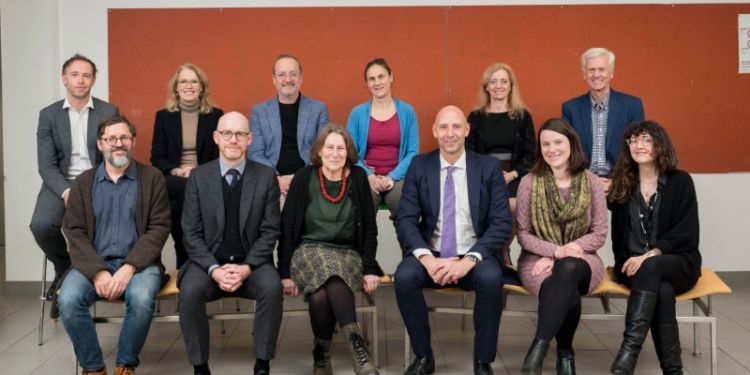'Changing Law, Changing Lawyers’: School of Law hosts public launch of the Legal Professions Research Group

The workshop ‘Changing Law, Changing Lawyers’ brought together leading scholars, practitioners and legal regulators to engage in a critical dialogue on transformations within the legal field.
On Monday 11 December 2023, founders of the Legal Professions Research Group (LPRG) in the School of Law at the University of Leeds (Mr Alex Batesmith, Dr Trevor Clark and Professor Hilary Sommerlad) hosted ‘Changing Law, Changing Lawyers’, a workshop that marked the public launch of the LPRG. This was made possible with funding from the School of Law, the Centre for Innovation and Research in Legal Education and the Centre for Business law and Practice.
Scholars, practitioners, and legal regulators gathered to discuss research on digitalisation, the impact of austerity, and the production and regulation of lawyers. The workshop invited participants from across the globe to consider contemporary challenges facing the legal profession, including their impact on professionalism, ethics, and moral authority, as well as strategies for addressing these challenges.
The first panel, 'Digital Law, Digital Lawyers', featured Professor James Faulconbridge (University of Lancaster), Professor Julian Webb (University of Melbourne), and Dr Sundeep Aulakh (University of Leeds), along with Discussant Professor Lisa Webley (Chair in Legal Education and Research, University of Birmingham). The speakers discussed how new technologies are transforming legal job roles and the profession, emphasising challenges related to ethics, competence, and regulation. There was also a thought-provoking critique on changes to the grand narratives surrounding AI and how it influences – and is influenced by – dominant social structures and norms.
The second panel ‘Austerity and the Crisis in Justice Systems' was chaired by discussant Alex Batesmith, who welcomed Dr Jo Wilding (University of Sussex), Professor Jacqueline Hodgson (University of Warwick), and Dr Matt Tidmarsh (LPRG, University of Leeds). The panellists discussed the impact of managerialism and austerity on the justice system, highlighting challenges in ensuring access to justice, provision of criminal defence, and delivering probation services. This sparked an insightful discussion about diminished concepts of professionalism, reduced expectations among professionals and the existential crisis in the justice system.
The third panel, ‘Making and Regulating Lawyers’ welcomed Professor Richard Moorhead (University of Exeter) Professor Luke Mason (University of Westminster) Professor Stephen Mayson (University College London) and Discussant Professor Joan Loughrey (Queen’s University Belfast). Panellists considered the changing nature of the legal profession and what it means to be a lawyer. This included conceptualising the engineering of ethical misconduct as the ‘legality illusion’; considering the evolving landscape of legal education and training in the context of advancing legal technologies; as well as the changing role of regulation, emphasising the need for lawyers to act ethically by prioritising higher principles that protect public interest over self-interest and client demands.
The event concluded with Professor Hilary Sommerlad chairing a roundtable featuring insights from discussants Professor Lisa Webley and Professor Joan Loughrey, together with Dr Stephanie Lemke (Oxford) and Professor Andrew Francis (Manchester Law School). This final session brought together the workshop’s key themes, summarising how current challenges had been reflected in the panel sessions and their implications for the future of the legal profession, education, and the rule of law.
Following the workshop there was time for networking. Those interested in the work of the Legal Professions Research Group are encouraged to contact the co-organisers via their details below.
Professor Hilary Sommerlad said ‘The difficult times that we are currently living through represent a particular challenge for the legal profession. We have seen legal practitioners and judges vilified for upholding the law and moves to depart from the UK’s commitment to international law. Access to justice has been drastically eroded, and the criminal justice system is in crisis. At the same time, the impact of new technologies on legal practice and the structure of firms is likely to be intensified as AI is progressively adopted. The implications of these developments and other trends not only for the regulation and training of lawyers, but also for the rule of law and social democracy, were explored in depth by our eminent speakers. Their evident significance for all lawyers underlines the value that the LPRG can bring.’
Dr Trevor Clark said: ‘The topics discussed at our launch event emphasise that the establishment of our legal professions research group is timely. We heard how lawyers find themselves in a moment of dynamic change. Multiple challenges and opportunities abound. The aim of the LPRG is to deepen understanding of the major trends that are reshaping this critical field. To this end we look forward to developing research collaborations with scholars, practitioners, regulators and policy makers, at home and abroad.’
Mr Alex Batesmith said ‘We were delighted that so many eminent speakers and participants working on the legal profession were able to join us. The resulting discussions on our panel themes of the impact of A.I., austerity and legal regulation change on the professions was rich and exciting. The interest that this workshop and the launch of our Legal Professions Research Group has generated speaks to the real appetite for debate in these fields, and we look forward to fruitful collaborations with colleagues nationally and international in the future.’




